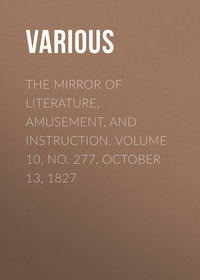The Mirror of Literature, Amusement, and Instruction. Volume 10, No. 277, October 13, 1827

Полная версия
Добавить В библиотекуАвторизуйтесь, чтобы добавить
Добавить отзывДобавить цитату
The Mirror of Literature, Amusement, and Instruction. Volume 10, No. 277, October 13, 1827
Авторизация